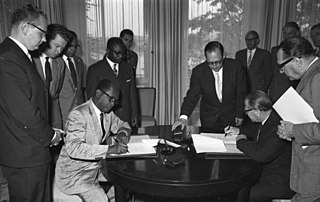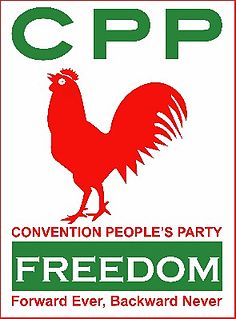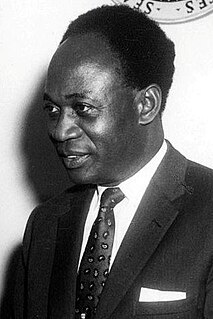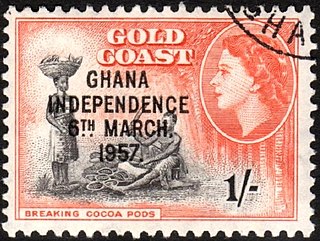The Republic of Ghana is named after the medieval West African Ghana Empire. The empire became known in Europe and Arabia as the Ghana Empire after the title of its emperor, the Ghana. The Empire appears to have broken up following the 1076 conquest by the Almoravid General Abu-Bakr Ibn-Umar. A reduced kingdom continued to exist after Almoravid rule ended, and the kingdom was later incorporated into subsequent Sahelian empires, such as the Mali Empire several centuries later. Geographically, the ancient Ghana Empire was approximately 500 miles (800 km) north and west of the modern state of Ghana, and controlled territories in the area of the Sénégal River and east towards the Niger rivers, in modern Senegal, Mauritania and Mali.

Komla Agbeli Gbedemah was a Ghanaian politician and Minister for Finance in Ghana's Nkrumah government between 1954 and 1961. He was known popularly as "Afro Gbede".

The Convention People's Party is a socialist political party in Ghana based on the ideas of the first President of Ghana, Kwame Nkrumah.

The Prime Minister of Ghana was the head of government of Ghana from 1957 to 1960 and again from 1969 to 1972.

The National Liberation Council (NLC) led the Ghanaian government from 24 February 1966 to 1 October 1969. The body emerged from a CIA-planned coup d'état against the civilian government led by Kwame Nkrumah. The Ghana Police Service and Ghana Armed Forces carried out the coup jointly, with collaboration from the Ghana Civil Service. It is alleged that the plotters were well connected with the governments of Britain and the United States, who some believe approved of the coup because Nkrumah challenged their political and economic ambitions in Africa.
Paa Kwesi Nduom or Papa Kwesi Nduom, is a business consultant and politician. He is the Progressive People's Party's aspiring candidate for president. In 2008, he was the Convention People's Party's nominee to contest the Ghanaian presidential election in December 2008. He was the member of parliament for the Komenda-Edina-Eguafo-Abirem constituency and had served as minister of state in various portfolios in the Kufuor's government between 2001 and 2007. He was named after his father as Joseph Hubster Yorke Jr.

Elections for the Legislative Assembly were held in the Gold Coast on 17 July 1956. They were won by Kwame Nkrumah's Convention People's Party, which took 71 of the 104 seats.

A constitutional referendum was held in Ghana on 27 April 1960. The main issue was a change in the country's status from a constitutional monarchy with Elizabeth II as head of state, to a republic with a presidential system of government.

Presidential elections were held for the first time in Ghana on 27 April 1960. The elections were held alongside a referendum on creating an executive presidency. The winner of the election would become the country's first President if the new republican constitution was passed.

A constitutional referendum was held in Ghana on 31 January 1964. The proposed amendments to the constitution would turn the country into a one-party state and increase the powers of President Kwame Nkrumah. With results showing that an implausible 99.91% of voters supported the amendments, the referendum was accused of being "obviously rigged". Voter turnout was reported to be 96.5%.

Elections for the Legislative Assembly were held for the first time in the Gold Coast on 8 February 1951. Although elections had been held for the Legislative Council since 1925, the Council did not have complete control over the legislation, and the voting franchise was limited to councils of chiefs. This was the first election to be held in Africa under universal suffrage.
Leaders of the 1966 military coup, including army officers Colonel E.K. Kotoka, Major A.A. Afrifa, Lieutenant General (retired) J.A. Ankra, and Police Inspector General J.W.K. Harlley, justified their takeover by charging that the CPP administration was abusive and corrupt. They were equally disturbed by Nkrumah's aggressive involvement in African politics and by his belief that Ghanaian troops could be sent anywhere in Africa to fight so-called liberation wars, even though they never did so. Above all, they pointed to the absence of democratic practices in the nation—a situation they claimed had affected the morale of the armed forces. According to General Kotoka, the military coup of 1966 was a nationalist one because it liberated the nation from Nkrumah's dictatorship—a declaration that was supported by Alex QuaisonSackey, Nkrumah's former minister of foreign affairs.

Samia Yaba Christina Nkrumah is a Ghanaian politician and chairperson of the Convention People's Party (CPP). In the 2008 parliamentary election, she won the Jomoro constituency seat at her first attempt. She is the daughter of Kwame Nkrumah, first President of Ghana.

Ghana gained independence from the British on 6 March 1957. It is a member of the Commonwealth of Nations. The country became a republic on July 1, 1960.
1960s in Ghana details events of note that happened in Ghana in the years 1960 to 1969.

Nkrumaism is an African socialist political ideology based on the thinking and writing of Kwame Nkrumah. Nkrumah, a pan-Africanist and Marxist–Leninist served as Prime Minister of the Gold Coast from 1952 until 1960 and subsequently as President of Ghana before being deposed by the National Liberation Council in 1966.
The National Reconciliation Commission was established in January 2002 by the parliament of Ghana. The goal of the commission was to establish an "accurate, complete and historical record of violations and abuses of human rights inflicted on persons by public institutions and holders of public office during periods of unconstitutional government." The Commission was formed after a new democratic party won the elections in 2000. The Commission covered human rights violations in Ghana from 1957 to 1993. It looked into government abuses and military coups staged by former president Jerry Rawlings. The members of the Commission worked until the end of 2004.










